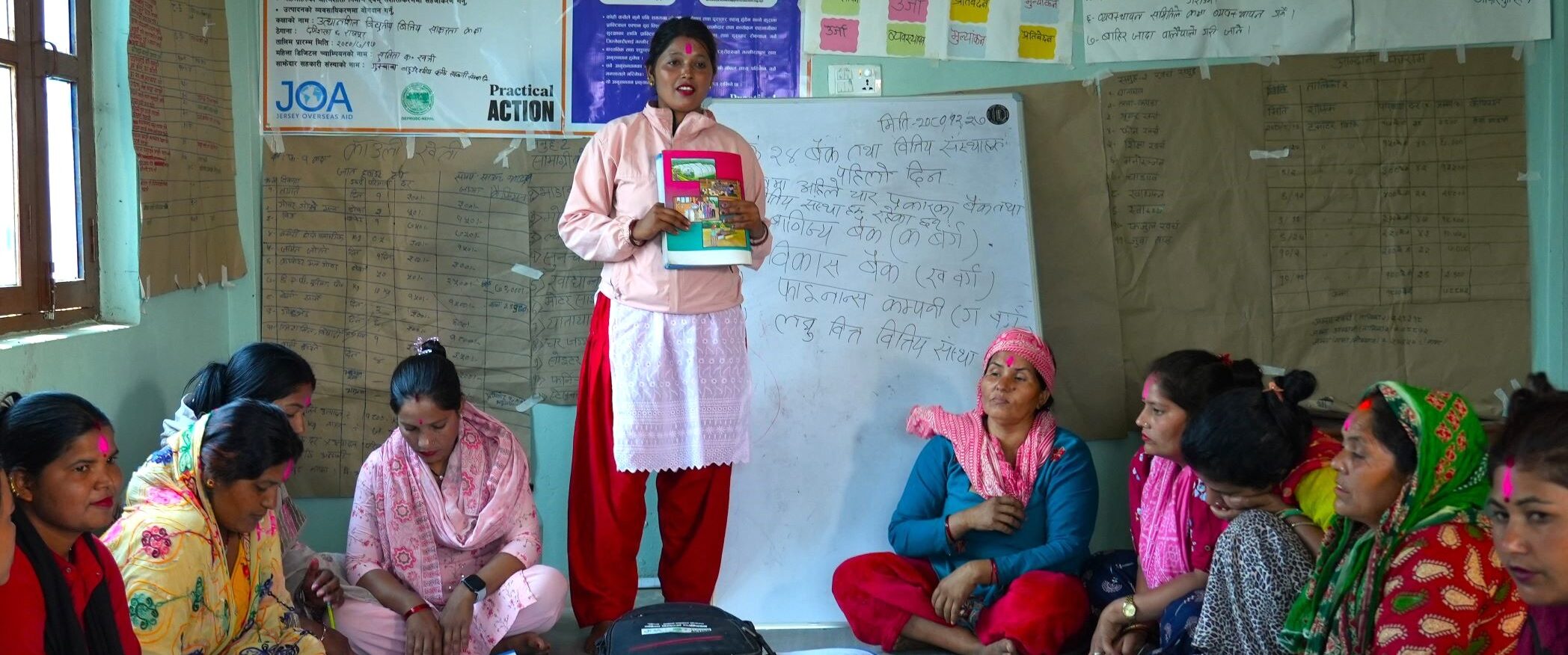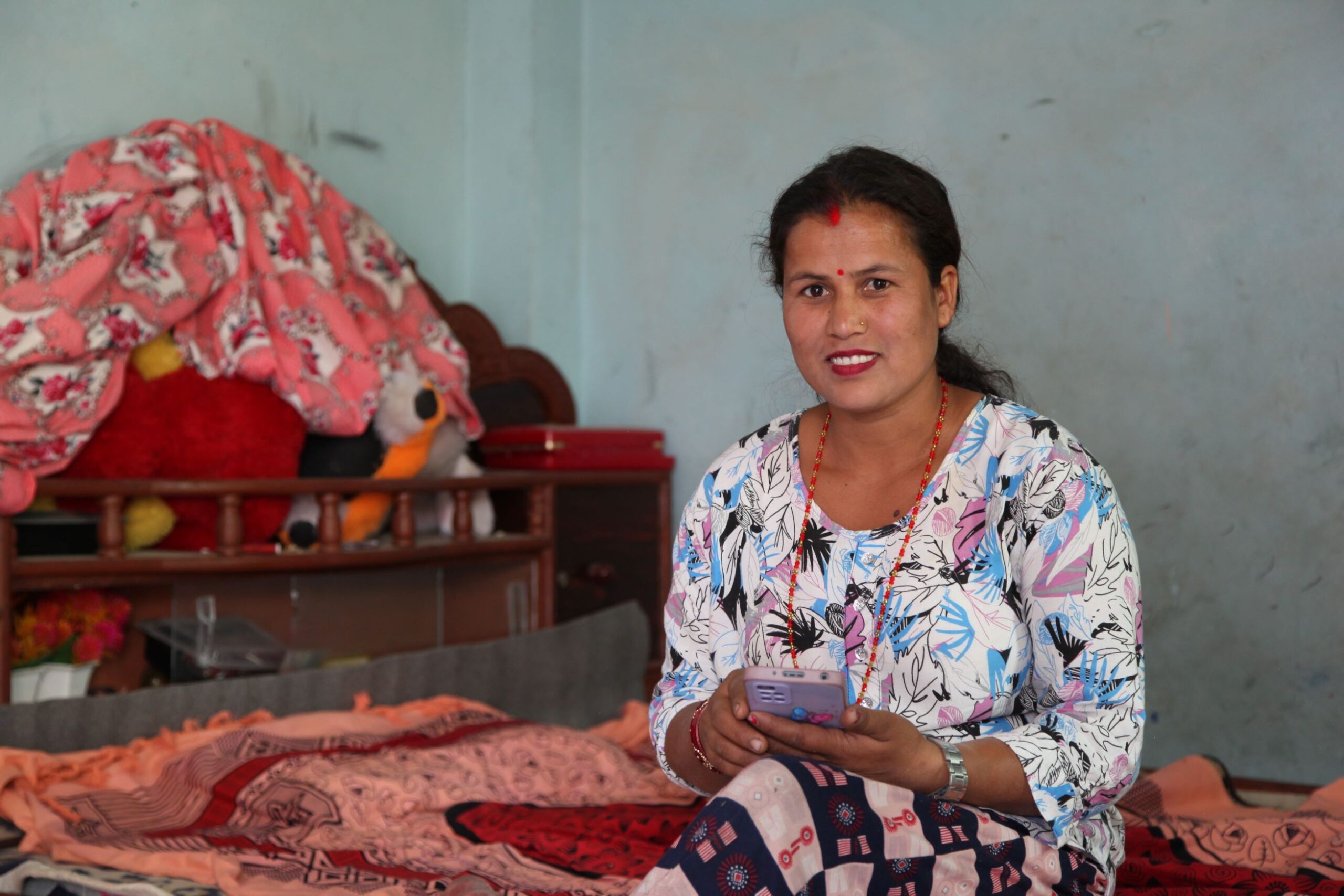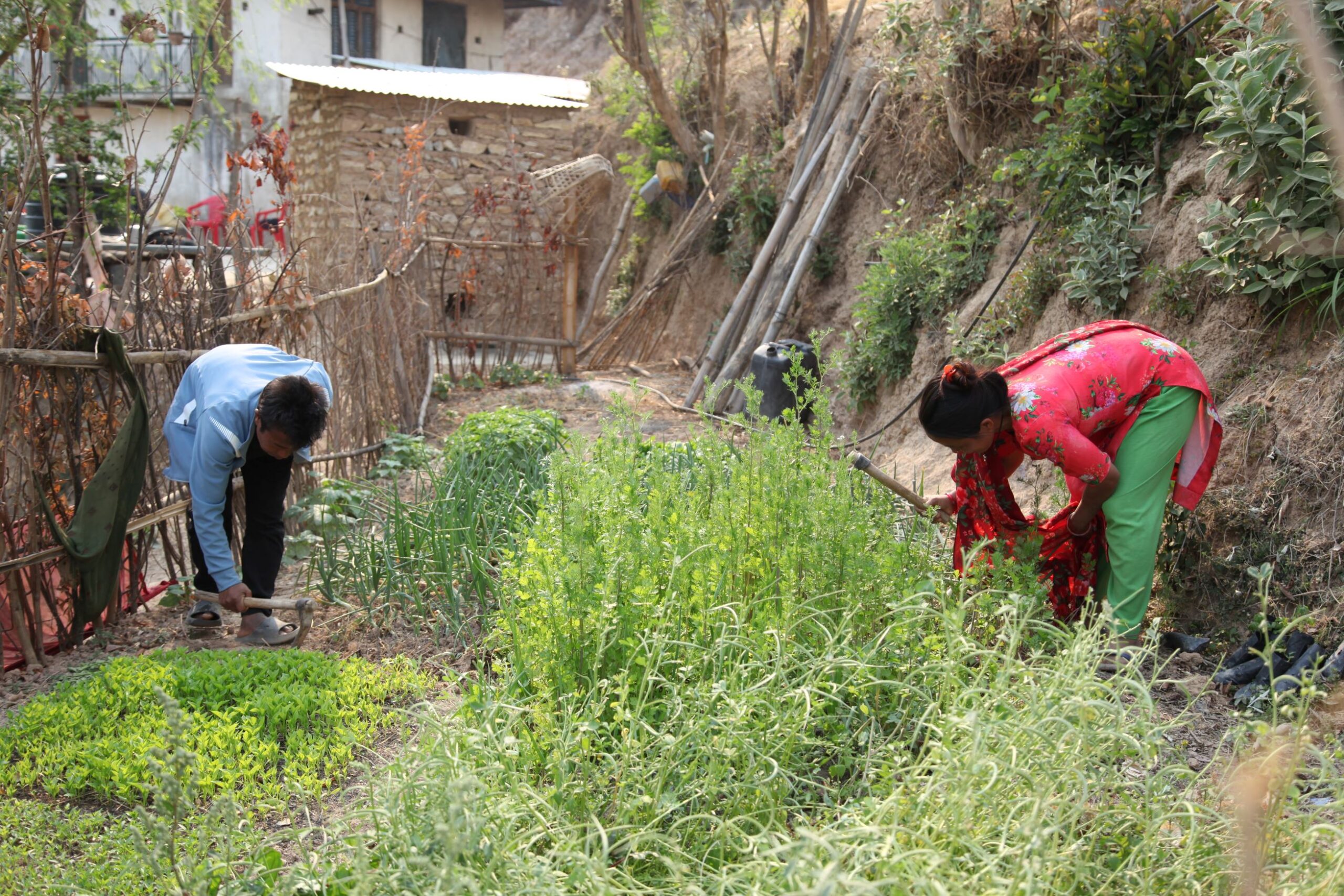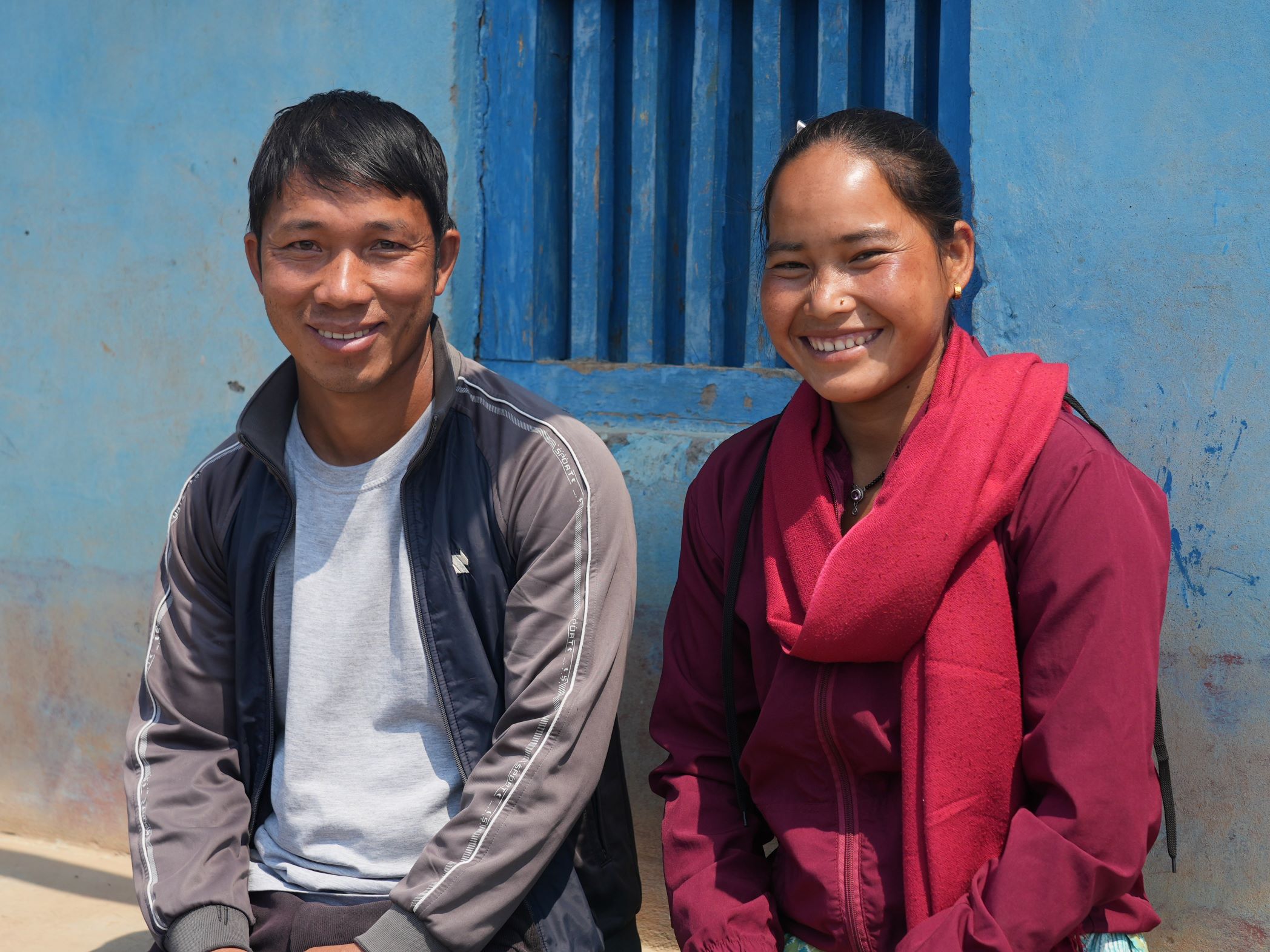In rural Nepal, where traditional gender roles prevail, a transformative initiative is underway. Through Practical Action’s “Empowering Women Farmers with Digital Finance” project, funded by Jersey Overseas Aid, women digital champions challenge stereotypes and lead households toward digital and financial literacy.
Subina Shrestha, Programme Associate in Nepal, engaged with male family members across villages, witnessing a profound shift: these initiatives not only empower women economically but also foster inclusive communities, paving the way for a thriving future for all.
From skepticism to support

Sunita KC, a Woman Digital Champion, has experienced a U-turn on the perception men have of her. “Initially, men in the village would comment, asking what a woman like me can teach about digital and financial literacy. But now, when I go to conduct household discussions in their homes, they listen to me”, she shared.
We live in a world where feminism is still discussed with a hint of hesitation. The notion of patriarchy is still present, especially in the rural areas of Nepal. Thus, last month, when I travelled to the villages of Dang and Rolpa, I wanted to know the perspective of male family members on an ongoing women-centric project.
The project aims to enhance women farmers’ awareness and knowledge of accessing, requesting, utilising, and managing digital financial products relevant to agro production and marketing promotion in Nepal’s Dang, Rolpa, and Rukum-East districts.
Women from the project areas are selected, trained, and assigned as Women Digital Champions (WDCs) to teach their communities financial education and digital literacy classes. Along with digital financial literacy knowledge, these classes help women farmers recognise their inner strength, build confidence and reduce interdependence, leading to agency-based empowerment.
Throughout our journey, we met many women participating in the project. Our WDCs eagerly shared their stories with us. They explained how Practical Action has made a significant difference in their households and the lives of other participants who attended their financial education and digital literacy classes. There were numerous examples of women who initiated their entrepreneurial journey, increased their knowledge of financial education and digital literacy, and built their interpersonal skills.
But, along with interacting with our project’s direct beneficiaries, I was curious about the male perspective on our project interventions. So, while my team collected stories from WDCs and participants from their classes, I had informal discussion sessions with male members of their families.
Changing household roles
My observation started from Bishni Lamichhane’s house, a first-generation participant from Shantinagar, Kumalgadi. We reached Bishni’s place at around 9 in the morning. As she walked us to her home, Raman Kumar Lamichhane, Bishni’s father-in-law, joined us midway with a bright smile. He welcomed us to his home and began to show us around.
After helping Bishni and the communication team set up a location for her interview, I sat down with Raman and began to talk with him. Raman was involved in our “Building Climate Adaptive Farming Opportunities and Improved Livelihood for Women and Marginalised Groups in Nepal (Samunnati)” project, and he described how the project helped him improve his agricultural land’s productivity. Raman greatly appreciated the benefits of the Geo Krishi app, which provides information on the weather and methods for tomato farming. I slowly turned our conversation towards the classes Bishni took and how he felt about them. He beamed and said how Bishni had been paying the utility bills for their and their neighbour’s houses through digital wallets.
He said, “Since my daughter-in-law is more aware of financial information, she handles big expenses, and I handle smaller expenses at home.”

This came as news to me. During various projects I have been involved in, I rarely find women taking care of the finances in their houses where men are present. It turned out that Bishni received the remittance sent by her foreign-employed husband through her online financial system. As Bishni has improved her digital financial literacy knowledge, she has handled significant finances at home, including the expenses incurred during the ongoing construction of their house. This shows the transformation in gender roles, where a daughter-in-law is trusted to handle the finances of her house, and also a shift in the perception of a woman’s role in her household.
The household dialogue session activity conducted by the project was also seen to have an impact on Bishni’s home. Under household dialogue, family members discuss and reflect on responsibilities, income, and decision-making to ensure better understanding between family members on family cooperation, promoting balanced and healthy family dynamics. This exercise also seeks to improve gender dynamics by encouraging workload sharing. Following the household dialogue session, Raman described how he realised the time consumed by every single task in their household, thus motivating him to start practising with his family, sitting together in the evening and allocating tasks for the next day. This ensures that household tasks are distributed evenly among family members and that no one is overworked.
Customised classes
The next day, we travelled to Triveni, Gaun Takura, to visit Man Kumari, a first-batch WDC who had completed conducting all her classes. Welcomed in a house surrounded by beautiful scenery, we instantly felt relaxed by sitting on her lawn. Upon conversing with Man Kumari’s husband, Khadga Bahadur Pun, I initially expected to hear only praises for the project’s positive impacts, as we had encountered during our trip. However, delving deeper into the discussion, I was struck by a new perspective offered by Khadga. He questioned the importance of financial education and digital literacy classes to women with limited capacity to read and write. This question led me to think about Parbata Kandel, someone who had never gone to school in her life but was able to write after attending our classes.
Most families we visited during this trip had their male members migrate abroad for employment. This made the women head of the household finance by default. Understanding this scenario, this project focuses on increasing women’s financial education, of which digital literacy is a part. Thus, our WDCs, trained to customise their classes per the participants’ needs, help the women with limited capacity to read and write and improve their knowledge of savings and investment. Many women we interacted with during this trip claimed that they had started to save what they could and put their savings in cooperatives, which could be used for future investment purposes. Additionally, having their savings in digital wallets ensured they received specific interest instead of lending it to their friends and family. Recognising their pivotal role in households, especially when husbands migrate for work, Practical Action aims to empower women and strengthen community resilience.


Improved relationships

Punkala Gharti Magar, our second generation of WDC from Runtigadhi, Holeri, was travelling to one of her students’ homes to conduct a household dialogue session. Riding on a motorcycle driven by her husband, Punkala looked determined. But Nim Kanta Gharti Magar, husband of Punkala, was an equal enthusiast of the project. Farmer and an entrepreneur by profession, Nim had just started Moringa farming in Ghorahi and spent most of his time there. While discussing the classes conducted by the project, he immediately wore his business hat and described the benefits business people were reaping from the classes. Through his wife, he explained how the knowledge had helped him in his business as previously buyers used to delay the payment, complaining about lack of physical cash and long distances to financial institutions. Now, he takes payments through digital wallets. He added that the classes motivated the women in his community to start income-generating businesses to be self-sufficient instead of relying solely on remittances sent by their migrated husbands. Few have started commercial and livestock farming; five women have started a spices mill.
The relationship between the husband and wife has also flourished. Our motto, “Big Change Starts Small”, was highlighted by the couple during their interview. Punkala described how her husband’s support has become an example in her community. Nim added, “I feel proud looking at the advocacy capability of my wife, and I enjoy learning from her.”
Reflecting on these stories, I was deeply moved by the positive ripple effects of our project. Each male individual I interacted with during our journey shared a unique story of transformative change within their community and their belief that by investing in women’s education, these initiatives not only addressed immediate challenges but also laid the foundation for long-term sustainable development, improving her household as well as social standing. This journey towards gender equality is challenging, but with continued support from families and society for inclusive initiatives, we can build a brighter future for all Nepalese women, one empowered woman at a time.
Learn more about our work in Nepal by visiting our country page and following us on LinkedIn.
About the author
Subina Shrestha
Programme Associate in Practical Action in Nepal. She has more than four years of experience in the Nepalese development sector and is currently pursuing a Master’s in Economics.